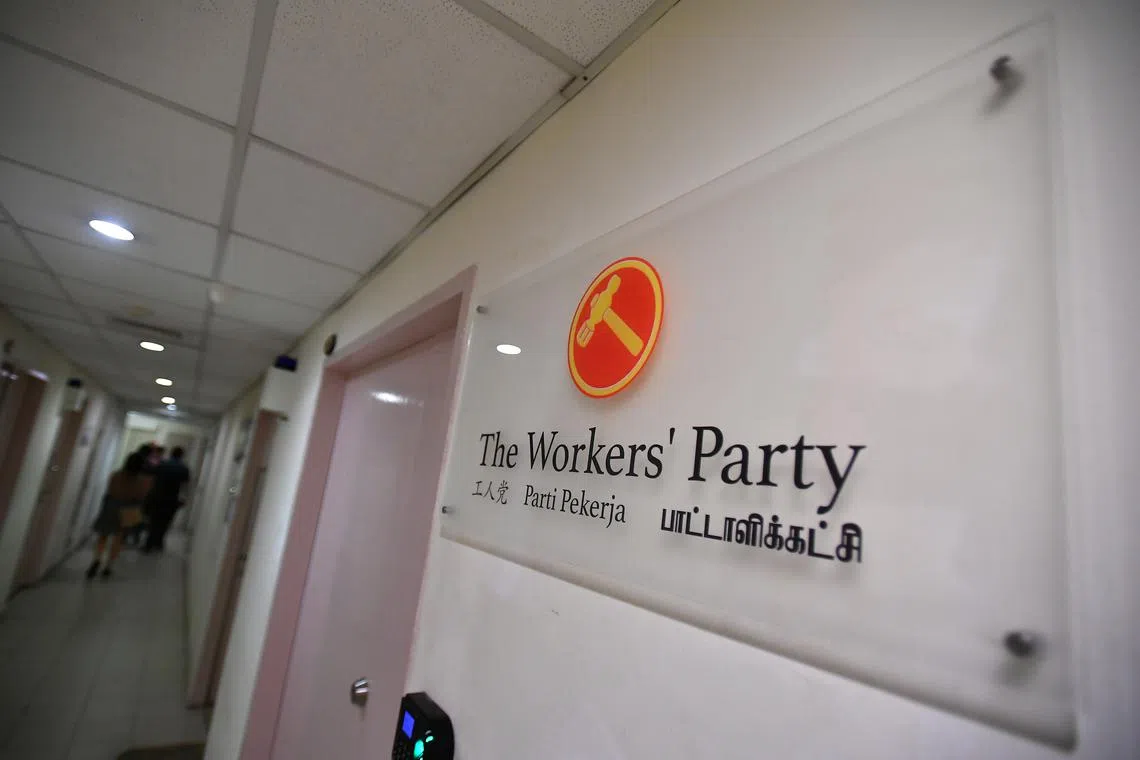Workers’ Party does not endorse any presidential candidate, reiterates objection to elected post
Sign up now: Get ST's newsletters delivered to your inbox

WP’s statement comes as the independence of presidential hopefuls has come under greater scrutiny during the past few days of the hustings.
ST PHOTO: LIM YAOHUI
SINGAPORE – The Workers’ Party (WP) says it does not endorse any presidential candidate, nor does it call on any of its members or volunteers to give assistance in any official capacity.
Responding to media queries, a spokesman said the party has, for the past three decades, consistently voiced its objection to the elected presidency and called for its abolition, as well as a reversion to a ceremonial presidency instead.
The party believes the current qualifying criteria for candidates are skewed towards those approved by the People’s Action Party (PAP), and that the elected presidency in its current form undermines parliamentary democracy, added the spokesman.
“It also serves as an unnecessary source of gridlock – one that could potentially cripple a non-PAP government within its first term – and is an alternative power centre that could lead to political impasses,” the spokesman noted.
WP’s statement comes as the independence of the presidential hopefuls – Mr Ng Kok Song, 75, Mr Tharman Shanmugaratnam, 66, and Mr Tan Kin Lian, 75 – has come under greater scrutiny during the past few days of the hustings.
Political analysts have also said the election is shaping up to be a partisan contest
Mr Ng, who has positioned himself as the only non-partisan candidate, earlier said there is a danger that Mr Tan, if elected, would be “manipulated” by the opposition party leaders backing him.
He also questioned whether Mr Tharman being elected would lead to a “oneself check oneself system”
Mr Tharman, who resigned from the Government and the PAP in July to contest the presidency, urged voters to “avoid simple labels”
Mr Tan said endorsements made by opposition figures have not injected party politics into the election as they were doing so in their personal capacity, and not as representatives of the parties they are associated with.
This came after Dr Tan Cheng Bock, chairman and founder of the Progress Singapore Party (PSP), and Mr Tan Jee Say, a member of the Singapore Democratic Party (SDP), turned up at a walkabout on Sunday to stump for him.
Other opposition figures who have lent support to Mr Tan Kin Lian include Peoples Voice chief Lim Tean, People’s Power Party chief Goh Meng Seng and Reform Party leader Kenneth Jeyaretnam.
On Monday, PSP said it is not endorsing any candidate, and that any support by any of its members is given in their personal capacity. It issued this statement after Dr Tan’s public endorsement of Mr Tan Kin Lian on Sunday.
A PSP spokesman told The Straits Times on Wednesday that the party accepted that Dr Tan Cheng Bock is supporting Mr Tan Kin Lian in his personal capacity as a former presidential candidate.
In an internal memo to PSP members and volunteers, PSP secretary-general and Non-Constituency MP Leong Mun Wai reiterated the party’s stance of not endorsing any candidate because “we support the principles that the president, as a symbol of the unity of Singapore, is meant to be independent and non-partisan”.
“Many members may disagree with our policy of non-endorsement, just as some members would be angry no matter who we choose to endorse... However, we must close ranks after the decision has been made,” he wrote.
On whether volunteering to be a polling or counting agent in the election is an act of partisanship, Mr Leong said in his memo that this is a “misconception”. “In being polling and counting agents, we are doing our part as citizens to ensure that our election process is fair and transparent, and not for any specific candidate,” he added.
On Sunday night, PSP volunteers were sent an e-mail asking them to sign up as counting agents for Mr Tan Kin Lian, with the e-mail claiming that this would help the PSP collect voting data ahead of the next general election.
PSP’s spokesman told ST on Wednesday that the e-mail was drafted at the initiative of an individual, whom the party did not name, and it was not approved for publication.
Citing teething issues with the party’s new membership system, the spokesman added that the e-mail was sent out in error.
In response to queries, SDP said its members and volunteers are free to express their views and give support to any candidate as private citizens.
“Many PAP members have also been heavily involved... presumably in their personal capacity. We believe that doing so is part of any citizen’s civic responsibility, and have no objections to SDP members getting involved as well,” it added.
ST has asked the PAP for comment on the matter.
Before the presidential hustings began, the Elections Department said political parties should not be involved in campaigning using their party names and symbols in support of a candidate.
However, political observers have pointed out that the Constitution and the Presidential Elections Act do not prohibit endorsements by politicians.
Some analysts, including Singapore Management University law don Eugene Tan, said it was disingenuous for someone like Dr Tan Cheng Bock to say he is endorsing a candidate in his personal capacity, given his political stature.
However, Dr Mustafa Izzuddin, a senior international affairs analyst at Solaris Strategies Singapore, said: “Support from politicians or past political affiliations does not make a presidential candidate partisan... What matters is how a candidate illustrates staunchly his non-partisanship after assuming the elected presidency.”


